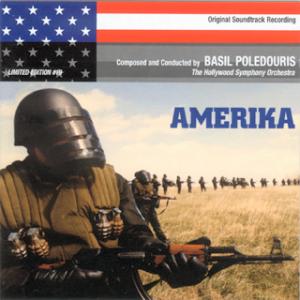************************************************************** EDITOR’s RECOMMENDATION September 2004 **************************************************************
Amerika
Music composed and conducted by Basil Poledouris
Performed by The Hollywood Symphony Orchestra
Orchestrations by the composer, Greig McRitchie, Jack Smalley and Steven Scott Smalley
Available on Prometheus PCR 519
Running time: 75.39
Purchase from: buysoundtrax

See also:
A love it or hate it and highly controversial proposition on its original US network screening in 1987, this massive seven part mini-series is largely unknown in the UK. Set 10 years after its date of production it is a political/military fantasy set in a US occupied by the Soviet Union. What a difference a couple of decades make… Fortunately the booklet to this CD release of Basil Poledouris' score comes with a useful context setting introduction by writer/director Donald Wyre, and a detailed episode by episode synopsis and production history by Christopher Landry which notes what is happening on screen for each of the cues included on the album.
Such an expansive, ambitious project was a gift to a composer with Basil Poledouris' sense of scale and gift for heartfelt melody, and having worked twice before with Donald Wrye (on Fire on the Mountain (1981) and House of God (1984)) he was a natural choice for the mini-series. The result was one of Poledouris' finest scores, a work to stand beside his fine Big Wednesday (1977) and Conan The Barbarian (1982).
The music on the CD, being culled from such a long show, is not the complete soundtrack, but rather highlights from an eight-and-a-half-hour work, recorded with an 80 piece orchestra at the cost of $1.2 million. The result is an album of the best of the music, the track selection and transfer being supervised by the composer. It makes for a very fine listening experience, with barely a routine moment.
From the main title, 'Amerkia' the influence of Aaron Copland is apparent, and there is an expansive, romantic quality to much of the writing which could have easily been applied to a classic Western. As Poledouris notes, "The main theme, written for full orchestra, speaks of the land. It's nostalgic, with a sense of loss, but not too sentimental. In a lot of ways I used the music of Aaron Copland as a model. Its harmonic structure is that of the folk song, and it's about the expanse and freedom of America. His music is full of optimism, and I put a spin on that. It's 'Dark Copland,' if you will." Indeed, episode two even included a section from Copland's The Tender Land, and Wrye also notes that the production referenced Bernard Herrmann's The Fantasticks several times.
To single out just a handful of tracks, 'Delvin's Return' is a lovely piece of lyrical, pastoral Americana with the quality of a slow, dreamlike dance and a gorgeous flute melody. 'All Prisoners' is uplifting and portentous, a fatalistic anthem foretelling conflict which has the power to send a shiver down the spine. 'Ancestor's Strength' develops Alethea's nostalgic theme for woodwinds and strings, a melody which recurs through the score in several fine variations. 'The Dance Begins' suggests a passacaglia with Russian overtones, the music building a powerful intensity which heard by itself appears to render any possible on-screen action redundant. 'Dieter's View' opens with a bleak cello solo evocative of Elgar in sombre mood, the arrival of the orchestra just for an instant hinting at that composer's famous cello concerto. The cello returns in 'Funeral' with a chilling solemnity, so much so that the following 'Ceremony Montage' offers welcome respite with its upbeat, pulsating Philip Glass like figures. 'Andre's View' opens with cold introspection, developing as a scourging, forlorn adagio which seemingly offers no hope. However, the finale, 'The Meaning' does provide a sense of tenderness, continuity and patriotic triumph, a sense that life will go on despite the horrors endured.
Poledouris concludes, "I grew up a lot during 'Amerika'; I gained a new confidence in my writing. Would I do it again? With this film and this director, in a heartbeat!" For fans of the composer this is an essential addition to the collection, while others who like their film music big, melodic and filled with folk-like Americana won't go wrong here.
Gary Dalkin
5
Return to Index